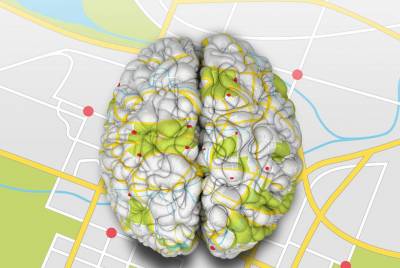Space & Memory
Neil BurgessGroup Leader
+44 20 7679 1147 |  |
Space & Memory Research
The Space and Memory group investigates the mechanisms of spatial cognition. Our research is directed at answering questions such as: how are locations represented stored and used in the brain? What processes and which parts of the brain are involved in remembering the spatial and temporal context of everyday events, and in finding one's way about?
To answer these questions we helped to pioneer the use of Virtual Reality in behavioural, neuropsychological and functional neuroimaging experiments. We also develop computational models of the mechanisms supporting navigation and spatial and episodic memory. These models are based on findings from neurophysiology, such as the representation of a rat's location within its environment found in the hippocampus. Our neuroimaging results show that the hippocampus is involved in human navigation. Where new accurate routes must be computed, good navigators activate the hippocampus more strongly than poor navigators, but the same individuals tend to activate the caudate nucleus when following very familiar routes. Perhaps because of this, activation of the caudate nucleus is also associated with rapid navigation. Remembering the spatial context of an event activates the left hippocampus. Tests in neuropsychological patients show the right hippocampus to be required for spatial navigation and the left in episodic memory. Within spatial memory, the hippocampus is specifically involved when viewpoint-independence is required.
The Space and Memory group based at the ICN has close links with the groups of Caswell Barry, Tim Behrens and Tom Mrsic-Flogel involved in single unit studies of spatial learning, cognition and memory.
Group Members
Post-doctoral Research Fellows
- Dr Michael Bukwich

m.bukwich@ucl.ac.uk Experimentalist at the Sainsbury Wellcome Centre, joint supervised by Caswell Barry. For my postdoc, I am studying the brain. More specifically, I am interested in how it finds flexible representations for decision making in partially-observable tasks.
- Dr Alexandra Constantinescu
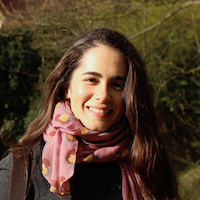
a.constantinescu@ucl.ac.uk I am a neuroscientist interested in how the brain forms maps of the world. During my PhD at the University of Oxford, we found that humans use the grid cell code to form maps of conceptual, non-spatial memories. During my post-doc at UCL, we are exploring how humans navigate their spatial and non-spatial memories as they use the memory palace technique. Moreover, we are collaborating with the University of Oxford to develop a novel analysis to characterize the grid cell code in physical space, using 7T fMRI.
- Dr Andrea Castegnaro
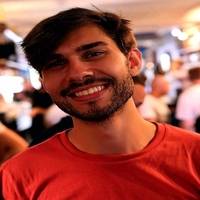
I create virtual reality paradigms based around medial temporal lobe region functionalities specifically designed for detecting pre-dementia Alzheimer's disease.
- Dr Jesse Geerts

jesse.geerts.14@ucl.ac.uk My research focuses on the relationship between reinforcement learning and representations of space in the hippocampal formation. Recent results suggest that these representations of space, encoded in place cells and grid cells, are important for representing non-spatial states too, and that a particular subtype of place cell encodes an animal’s intended destination. I currently work on investigating the function of these “splitter cells” in reinforcement learning through computational modelling. In the future, I hope to test predictions coming from these models in experiments.
- Dr Robin Hayman
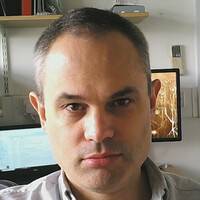
r.hayman@ucl.ac.uk I use a combination of high-density electrophysiology, two-photon microscopy, optogenetics and behaviour to elucidate the microcircuits that underpin spatial representation and learning in the hippocampal system of rodents.
- Dr Thomas Jahans-Price
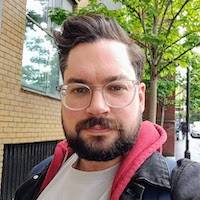
t.jahans-price@ucl.ac.uk My current research involves conducting electrophysiological recordings from high density probes chronically implanted in freely moving mice. I’m interested in the neuronal computations underlying spatial exploration and navigation. Specifically: how neurons in the hippocampus and entorhinal cortex build map-like representations of an environment; how these maps are consolidated; how they are retrieved to guide future behaviour and how they are updated to allow flexible behaviour.
Previously I have worked on interactions between hippocampus and prefrontal cortex in spatial decision makings tasks and on the impact changes in hippocampal circuitry have on downstream dopamine release.- Dr Oliver Vikbladh

I use a combination of computational modelling of behavior, neuroimaging (fMRI and MEG) and patient work, to investigate the intersection of memory and decision-making processes in the human brain.
- Dr Misun Kim

I am interested in how people navigate and build mental models (“cognitive maps”) of the world. Using virtual reality and non-invasive neuroimaging, I studied how we find our way in (a)typical 3D environments (e.g. roller coaster, zero gravity spaceship, non-Euclidean surface). I want to understand the geometry and format of cognitive maps and how they can be utilized for various cognitive processes, including memory, inference, and imagination. Hopefully, it will bring clinical and technical applications someday! (I wanted to build artificial memory chips when I was a young student).
PhD Students
- Mattias Horan

mattias.horan.19@ucl.ac.uk Studying flexible behaviours and their implementation in the enthorhinal-hippocampal circuit. Trained as a doctor and hoping to learn enough about the brain to push for clinical change when I return to medical practice.
- Laura Convertino
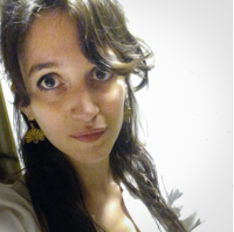
laura.convertino.18@ucl.ac.uk I am exploring the mechanism of misremembering, and the interaction of semantic and episodic memory in this phenomenon. My project combines behavioural, neuroimaging (MEG and fMRI) and computational approaches. I am supervised by Neil Burgess and Daniel Bush, co-supervised by Karl Friston (UCL), and collaborate with Steve Fleming (UCL) and Michael Kirchhoff (UOW). I started my PhD after having qualified as Medical Doctor at the University of Pavia, Collegio Ghislieri, and I am now a student of the Leverhulme Doctoral Training Programme for the Ecological Study of the Brain (ECOLOGICAL BRAIN DTP).
- Nicole Maug
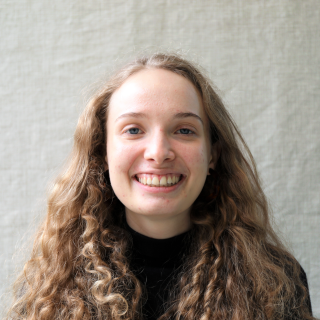
nicole.maug.15@ucl.ac.uk I work on the neural mechanisms of memory consolidation in humans. Specifically, my project focuses on how brain-wide systems and single-neurons in the medial temporal lobe interact to support episodic memory consolidation during one-shot learning.
- Ingrid Martin
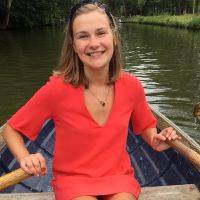
ingrid.martin.17@ucl.ac.uk I am a PhD student funded by UCL Institute of Mental Health, supervised by Rick Adams and Neil Burgess. My research focuses on how neuroimaging and computational modelling can help us better understand the underlying mechanisms of delusions in Schizophrenia.
- Luke Emrich-Mills

luke.emrich-mills.19@ucl.ac.uk My research involves developing novel virtual reality tasks to test spatial memory in healthy ageing and early Alzheimer’s disease. Current work makes use of a head-mounted display with integrated eye-tracking to detect subtle memory-driven changes in eye movements.
- Eleanor Spens
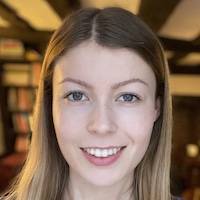
My research involves computational modelling of how the hippocampal-neocortical network semanticises memories over the course of systems consolidation, and specifically how this relates to replay. In other words, I am interested in how replay might help convert episodic memories into a form that better supports generalisation, inference, and prediction. I am a part-time student with a background in machine learning, and I am supervised by Neil Burgess.
- Changmin Yu

changmin.yu.19@ucl.ac.uk My background is in mathematics and statistics. I am generally interested in the theory and application concerning the different types of cells medial Entorhinal Cortex (such as grid cells) as well as the relation with hippocampal formation. I am currently exploring the possible relation between the velocity controlled oscillators and Fourier analysis and spectrum based on place cell inputs. I am also a member of the CDT in Foundational AI program.
- Faya Movchan
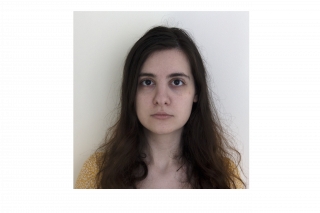
For my undergraduate degree I received a double major in Psychology and Computational Neuroscience, as my general interests combine human cognition and a study of neural networks that underlie those cognitive processes. For my PhD I am working on the role of grid-like representations in recognition memory. I aim to detect the presence of those representations as a function of eye-movements in visual recognition memory, using functional neuroimaging. My work will involve developing Virtual Reality tasks and data analysis. I am hoping to prove the validity of a computational model of visual recognition memory via grid cells created earlier in the Space and Memory lab.
- Katarzyna Rudzka
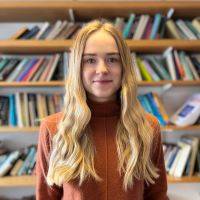
The purpose of my research is to investigate the mechanisms underlying path integration, a navigational strategy based on the integration of self-motion cues, in humans. Firstly, I wish to understand whether there are separate angular and linear components of path integration, and if so, whether they are affected differently by the Alzheimer’s neuropathology. To this end, I will use an immersive virtual reality with the goal of ultimately developing spatial diagnostic tools for pre-dementia Alzheimer’s disease. Secondly, using wearable OP-MEG scanner, I aim to search for an explicit allocentric travel direction signal as a candidate requisite for path integration computations.
- Riccardo Ratto
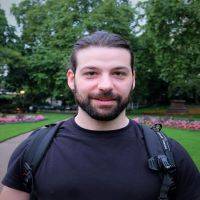
I am a neurobiologist by training and in my PhD I am going to combine 2-photon microscopy, a new 2D virtual reality system and computational approaches to investigate multisensory integration in the Hippocampus of mice during navigation. I am particularly interested in studying the topographical distribution and functional characterization of visual and reward-related inputs modulating Place cells’ activity, both at the cellular and population level. I am the recipient of a BBSRC-founded scholarship under the London Interdisciplinary Doctoral Programme, my project is supervised by Dr Guifen Chen (QMUL) and Prof. Neil Burgess (UCL) and collaborate with Dr Robin Hayman (UCL) and Dr Zilong Ji (UCL).
Research Assistant
- Guglielmo Reggio

My background is in philosophy, physics and machine learning. My main research interests lie at the intersection between cognitive computational neuroscience and machine learning. In particular, I am interested in understanding how humans and animals can develop the flexible behaviour that machine learning systems lack when dealing with novel tasks and unfamiliar, often only partially observable environments. Currently, I am working on understanding how the hexadirectionally modulated signal characteristic of grid cells emerges from their combined activity, via computational modelling.
 Close
Close




